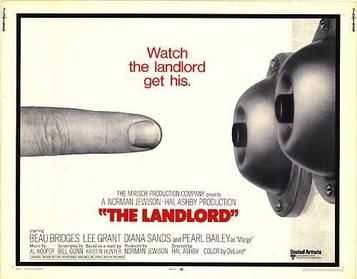On the surface, The Landlord (1970) seems like a film about gentrification, and the converting of a poor neighborhood into something better. As the film begins, we see Elgar, the white, upper class aristocrat (who totally reminds me of the rich white kids I went to high school with…nostalgia) and hear of his plans to change a neighborhood and make it successful. He comes into Park Slope in a white suit, white car, and a naïve outlook on life, totally looking like “the landlord.” This gave me the original impression that he would be a domineering, controlling presence in the neighborhood. But as the film progresses, we see less gentrification, and more personal change and racial interaction. We see vastly different situations in the rich, upper class white scenes, and the poor, black neighborhood scenes, and how Elgar (Beau Bridges) struggles to find a balance between the two. The film shows him and his maturation at the age of 29, realizing who he was, rather than being a product of his parents’ success. We see how he adjusts to living in the mostly black neighborhood, and how he interacts in a completely different situation. This is definitely characterized in his romances/flings with Lanie and Fanny. He directly rebels against his mother’s intentions and continues his relationship. He also supports the neighborhood and its people when arguing with his parents, which shows Elgar’s growing independence.
I didn’t really feel like The Landlord showed neighborhood change. As mentioned previously, it shows and individual change. Elgar basically assimilated and became a part of the neighborhood, racially, romantically, and socially. The neighborhood didn’t change; he did. There are some scenes that show individual change, rather than neighborhood change. I also feel that it was more of a change in racial attitudes, rather than the change in the neighborhood as a whole. For example, the scene with Fanny’s boyfriend and the axe felt racially driven to me. For the predominantly black neighborhood, I thought that people had to adjust to and learn that “the rich white man” was not trying to oppress them or ruin their neighborhood; he was trying to cooperate and make things work.
Regarding gentrification, I don’t think Elgar shows or embodies it at all throughout the film. His original plans set out on doing so, but his actions in the movie contradicted his intentions. By definition, gentrification is “movement of middle class families into urban areas causing property values to increase and having the secondary effect of driving out poorer families.” By this definition, I don’t feel like Elgar did anything in the film to follow that standard. He wanted to set up a house for himself, which he did. But did he drive out the poorer families? He definitely did not. Did he move other families in as well? Nope. It was more about the individual changing, rather than a drastic change. The neighborhood, its residents, and the “gentrifier” (Elgar) would not really work in improving and gentrifying the mostly black neighborhood. The tenants would be unwilling to accept the changes and work to change their situation. I think that the people of the neighborhood were complacent with their area. By gentrifying and changing Park Slope in that particular situation, it would not have been successful. If Elgar were portrayed as more cold and ruthless, rather than sympathetic and open, he would have definitely been more of a symbol for gentrification. However, the film showed his assimilation into the neighborhood, rather than the gentrification of it.
BTW. The poster for this movie is totally and ridiculously sexual. Ew.

